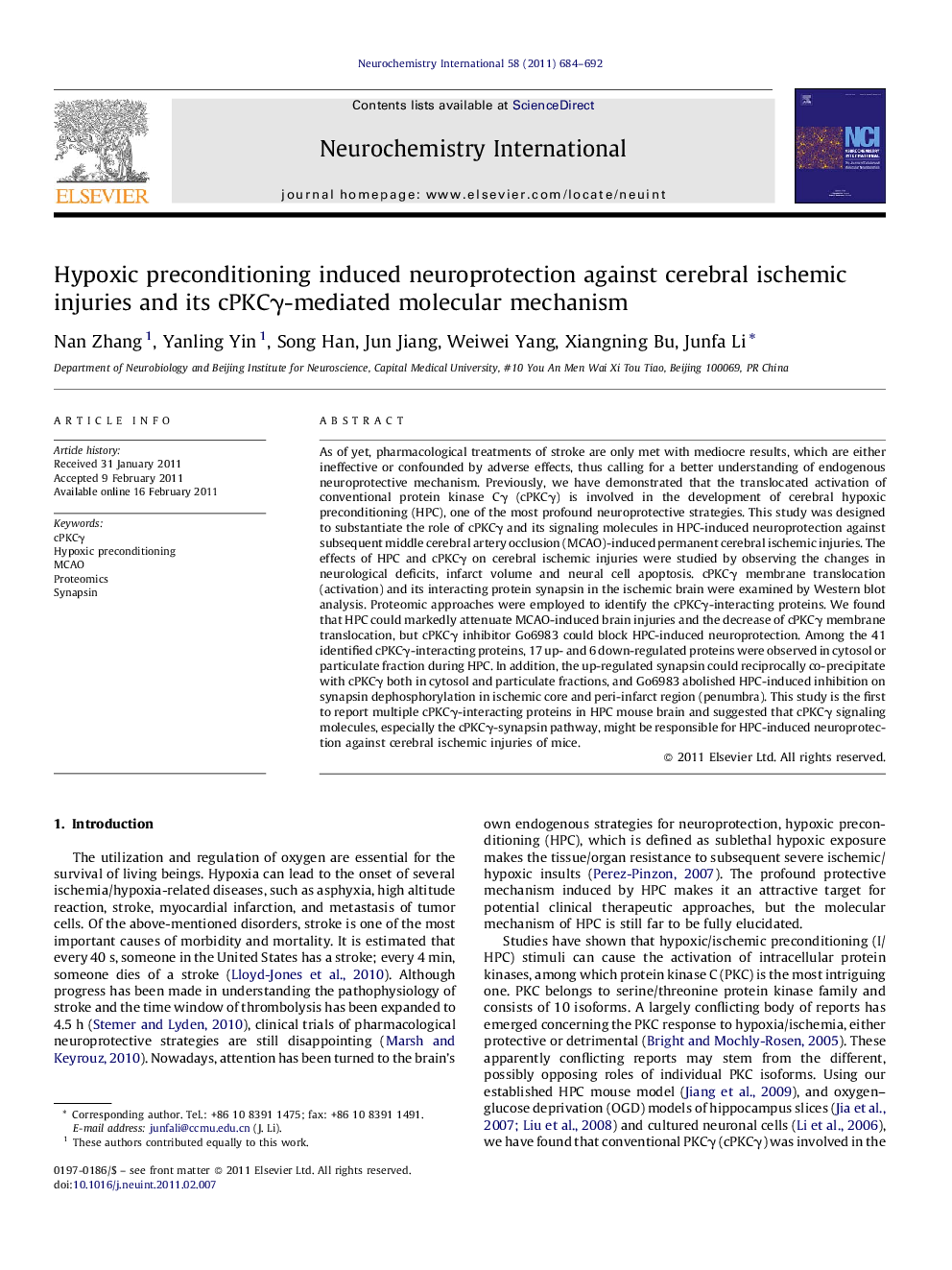| کد مقاله | کد نشریه | سال انتشار | مقاله انگلیسی | نسخه تمام متن |
|---|---|---|---|---|
| 2201145 | 1100000 | 2011 | 9 صفحه PDF | دانلود رایگان |

As of yet, pharmacological treatments of stroke are only met with mediocre results, which are either ineffective or confounded by adverse effects, thus calling for a better understanding of endogenous neuroprotective mechanism. Previously, we have demonstrated that the translocated activation of conventional protein kinase Cγ (cPKCγ) is involved in the development of cerebral hypoxic preconditioning (HPC), one of the most profound neuroprotective strategies. This study was designed to substantiate the role of cPKCγ and its signaling molecules in HPC-induced neuroprotection against subsequent middle cerebral artery occlusion (MCAO)-induced permanent cerebral ischemic injuries. The effects of HPC and cPKCγ on cerebral ischemic injuries were studied by observing the changes in neurological deficits, infarct volume and neural cell apoptosis. cPKCγ membrane translocation (activation) and its interacting protein synapsin in the ischemic brain were examined by Western blot analysis. Proteomic approaches were employed to identify the cPKCγ-interacting proteins. We found that HPC could markedly attenuate MCAO-induced brain injuries and the decrease of cPKCγ membrane translocation, but cPKCγ inhibitor Go6983 could block HPC-induced neuroprotection. Among the 41 identified cPKCγ-interacting proteins, 17 up- and 6 down-regulated proteins were observed in cytosol or particulate fraction during HPC. In addition, the up-regulated synapsin could reciprocally co-precipitate with cPKCγ both in cytosol and particulate fractions, and Go6983 abolished HPC-induced inhibition on synapsin dephosphorylation in ischemic core and peri-infarct region (penumbra). This study is the first to report multiple cPKCγ-interacting proteins in HPC mouse brain and suggested that cPKCγ signaling molecules, especially the cPKCγ-synapsin pathway, might be responsible for HPC-induced neuroprotection against cerebral ischemic injuries of mice.
The HPC stimuli can induce the membrane translocation (activation) of cPKCγ. Activated cPKCγ interacts with its mediated proteins, such as synapsin (SYN), to affect protein folding and assembly, proteasomal degradation, oxidative stress, energy metabolism, neural development and neurotransmitter release to play its role of neuroprotection against cerebral ischemic injuries.Figure optionsDownload as PowerPoint slideResearch highlights
► HPC inhibited the decrease of cPKCγ membrane translocation in ischemic cortex.
► HPC attenuated MCAO-induced brain injuries, which was blocked by cPKCγ inhibitor.
► Multiple cPKCγ-interacting proteins were identified in the brain of HPC mice.
► cPKCγ-synapsin may be responsible for HPC-induced neuroprotection.
► This study expanded our understanding in the molecular mechanism of cerebral HPC.
Journal: Neurochemistry International - Volume 58, Issue 6, May 2011, Pages 684–692